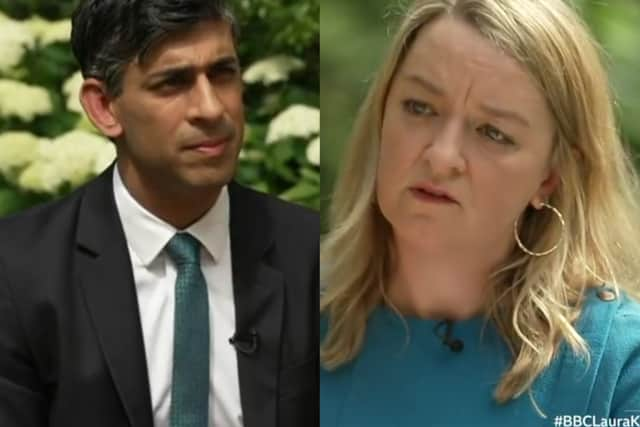Rishi Sunak: Laura Kuenssberg tells PM he is living in a ‘parallel universe’ over the economy and NHS
and live on Freeview channel 276
Rishi Sunak has been told he risks sounding like he is “living in a parallel universe” over his comments about the economy and NHS.
The Prime Minister today appeared on the BBC’s Sunday With Laura Kuenssberg, where he faced a grilling over hospital waiting times and the current crisis being faced by mortgage holders. Sunak told struggling Brits to “hold their nerve” with interest rate hikes as he insisted “there is no alternative” to stamping out inflation, before arguing that the state of the NHS is improving.
Advertisement
Hide AdAdvertisement
Hide AdHe claimed that the number of people waiting two years for treatment was “practically eliminated” last year, but was accused by Kuenssberg of picking “selective statistics”. She pointed out that the overall number of people waiting is the highest it has ever been, to which Sunak replied: “That’s because we’ve had a pandemic, Laura.”
Questioned on the economy, the Prime Minister argued that “inflation is the enemy” as he said he supported the Bank of England’s decision to raise interest rates to a 15-year high last week, leaving mortgage-holders bracing for a significant jump in their monthly repayments. The increase aims to reduce inflation, which measures the rate of rising prices, and remained at 8.7% in May despite efforts to tame it.
Chancellor Jeremy Hunt on Friday (23 June) announced that he had shaken hands on a plan with the banks to help mortgage holders, with lenders agreeing to give people a 12-month minimum before repossession proceedings start and allowing those “anxious” about their finances to temporarily switch to interest-only payments. But he held off on offering government support, despite criticism from opposition parties and some Conservative Party backbenchers.


Kuenssberg pressed Sunak on Sunday (25 June) on whether there was a “less painful” way to tackle the issue of inflation, before telling him: “This week you’ve told people that it’s going to be OK. Do you understand why people looking at their mortgage bills, looking at their shopping bill, worrying about keeping a roof over their heads, are going to listen to you and think ‘it’s not going to be OK for me’.
Advertisement
Hide AdAdvertisement
Hide Ad“Doesn’t it sound to many people, or might it risk sounding, like you’re in some kind of parallel universe where the NHS is getting better and the economy is going to be OK? It’s not the experience of millions of people.”
But the Prime Minister insisted that he understands that times are tough - and looked to reassure the public. “I’ve never said that it’s not challenging, I’ve never said that this isn’t going to be a difficult time to get through,” he replied. “But what I want to give people is the reassurance and confidence that we’ve got a plan, the plan will work and we’ll get through this. That’s exactly what people should be hearing from their prime minister and their government.”
He added: “I get that this is challenging and that’s going to have an impact on me in the short term, but we’ve got to stick to the course and I want people to be re-assured that we’ve got to hold our nerve, stick to the plan, and we will get through this.”
Elsewhere in the interview, Sunak was asked about his notable absence last week from the House of Commons debate and vote on the Privileges Committee’s findings on Boris Johnson. MPs voted to support the report, which concluded that the former Prime Minister had misled Parliament over the Partygate scandal.
Advertisement
Hide AdAdvertisement
Hide AdResponding to accusations of being too “weak” to stand up to his ex-boss, Sunak explained that he had been absent from the Commons because of his involvement in an event organised by the charity Jewish Care.
But, after reiterating his full support and respect for both the committee and the decision made by MPs last Monday, he stressed that he had alrady demonstrated his integrity and commitment to his principles by resigning from Johnson’s Cabinet last summer.
“It’s right for people, whatever their position, to face responsibility and accountability for their actions. That has happened and most importantly, Boris Johnson is no longer an MP,” Sunak said. Responding to whether he should have prioritised the debate and vote over the charity event, Sunak continued to Kuenssberg: “Your point is, do I have to demonstrate my integrity and my leadership? I did that when I resigned.
“I demonstrated that I was prepared to stand up for what I believe in… It is not an easy or common thing for a chancellor to resign from government. I did because I disagreed with Boris Johnson.”
Advertisement
Hide AdAdvertisement
Hide AdHe then re-directed the debate towards the next general election, which is due towards the end of 2024, remarking: “Actually, what I demonstrated by resigning from Boris Johnson’s government was that I was prepared to stand up for my principles. Keir Starmer sat there for four years next to Jeremy Corbyn, saying he was the right person to lead our country.. That speaks to his principles, my resignation speaks to mine.”
Comment Guidelines
National World encourages reader discussion on our stories. User feedback, insights and back-and-forth exchanges add a rich layer of context to reporting. Please review our Community Guidelines before commenting.
